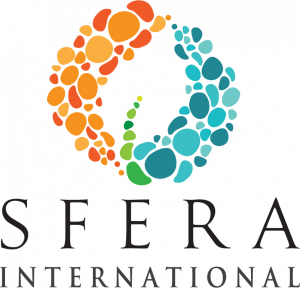The primary goal of this guide is to examine how multicultural education can alter the learning environment and thereby influence young people’s relationships, attitudes, and behaviours.
The guide identified four primary topics:
- Definitions of Multicultural and Intercultural Environments
- Soft Skills for Members of Youth Organisations
- Intercultural Mindsets
- Suggestions for the creation of a successful Multicultural Environment
This Guide informs current theories concerning learning environments, young people from minority groups, and the interaction between traditionally dominant and subordinate groups.
 Many people use the terms diversity and multiculturalism interchangeably, when in fact, there are major differences between the two. Diversity is defined as the differences between people. These differences can include race, gender, sexual orientation, religion, background, socioeconomic status, and much more. Multiculturalism goes deeper than diversity by focusing on inclusiveness, understanding, and respect, and also by looking at the unequal distribution of power in society. In a multicultural environment, people accept and embrace the differences of others into their lives.
Many people use the terms diversity and multiculturalism interchangeably, when in fact, there are major differences between the two. Diversity is defined as the differences between people. These differences can include race, gender, sexual orientation, religion, background, socioeconomic status, and much more. Multiculturalism goes deeper than diversity by focusing on inclusiveness, understanding, and respect, and also by looking at the unequal distribution of power in society. In a multicultural environment, people accept and embrace the differences of others into their lives.
In this section we will propose different definitions of Multicultural and Intercultural environments.
A Multicultural environment is a place where members of different cultures interact and experience intergroup relationships and results.
Most importantly, educational theory and practice must pay more attention to the relationship between “minority” groups rather than focusing solely on the whole.
‘Multicultural environment’ means diversity in terms of ethnicity, gender, religion, social belonging, etc. A multicultural environment retains workers from a variety of cultural backgrounds. The work in such environments differs regarding various approaches to time, information, planning, decision- making, relationships, communication style, power, conflict resolution, developing leadership and motivation (Charis, 2012).
Organisations and cultures with values as lower uncertainty avoidance, higher femininity, and lower power distance strive to maximise the benefits of diversity – as in the case of the Scandinavian countries, for example (Hofstede, 2001). Knowledge of cultural differences may help employees operating in a multicultural environment to reduce potential misunderstandings and be able to foresee the possible reactions of their partners (Konečná, 2006). Work in multicultural teams re-quires flexibility, adaptation, understanding and respect for different cultures and values, tolerance, open-mindedness, friendly communication and good non-verbal communication skills.
An intercultural environment is defined as such by its constitutive elements of a delineated space of communication and of involved actors with different cultural features. Within this space of communication, the major cultural components of involved actors (symbols, language, norms, values, and artifacts) differ significantly, resulting in the need to adopt effective communication practices. In an organisational framework, where a certain degree of cooperation, coordination and effectiveness is required, geographic variation is indicative of the need for intercultural awareness and resilience.
The European Migration Network (EMN) defines multiculturalism as “A policy that endorses the principle of cultural diversity and supports the right of different cultural and ethnic groups to retain distinctive cultural identities ensuring their equitable access to society, encompassing constitutional principles and commonly shared values prevailing in the society.”
Spring Institute distinguishes two terms: while “multicultural” describes a society that contains several cultural or ethnic groups, which do not necessarily always interact with each other, “Intercultural” is the word which describes communities in which there is a deep understanding and respect for all cultures. Thus, intercultural communication focuses on the mutual exchange of ideas and cultural norms and the development of deep relationships. In an intercultural society, no one is left unchanged because everyone learns from one another and grows together.
Intercultural dialogue is a topic which is actively promoted both by the Council of Europe and the European Union through their policies and programmes in the field of youth and in other sectors.
In the White Paper on Intercultural Dialogue, the Council of Europe defines the term Intercultural Dialogue as “an open and respectful exchange of views between individuals, groups with different ethnic, cultural, religious and linguistic backgrounds and heritage on the basis of mutual understanding and respect. It operates at all levels – within societies, between the societies of Europe and between Europe and the wider world.”
To build an intercultural environment it is necessary to have intercultural competences.
lntercultural competence is the ability to function effectively across cultures, to think and act appropriately, and to communicate and work with people from different cultural backgrounds – at home or abroad. Intercultural competence is a valuable asset in an increasingly globalised world where we are more likely to interact with people from different cultures and countries, who have been shaped by different values, beliefs and experiences.
 Soft Skills is a term used to indicate transversal personal skills such as social attitudes, language and communication skills, the ability to work in a team, and other personality traits that characterise relationships between people.
Soft Skills is a term used to indicate transversal personal skills such as social attitudes, language and communication skills, the ability to work in a team, and other personality traits that characterise relationships between people.
These skills have deep roots in the lives of each individual and develop over the course of their life.
Soft Skills are traditionally considered complementary to Hard Skills, which are the skills needed to perform a certain type of task or activity. In fact, they do not refer to a specific one, but concern all professional sectors. They are a sign of maturity in relation to oneself, to others, and to work.
Soft Skills are key to success both in personal and professional life. They are essential for obtaining good results in the world of work, in general, but above all when undertaking and managing entrepreneurial activities.
These skills, as well as being transversal, are also transcultural, because they are not specific to a particular culture.
Having some of these Soft Skills (problem-solving ability, resilience to stress, communication skills) makes it easier to adapt to a new culture and create connections between one’s own culture and the new culture with which one comes into contact.
Furthermore, interaction with other cultures offers the opportunity to implement the soft skills that one already possesses.
The term ‘Soft Skills’ was created in the late 1960s by the US military and referred to any skill that does not employ the use of machinery: social skills needed to lead groups and motivate soldiers to win the war, inspections of troops, and supervision of office personnel.
In 1972 the term ‘Soft Skills’ was formally introduced in a CONARC (Continental Army Command) training manual.
Since then, the examination of Soft Skills has also expanded to other work sectors and many studies have been carried out that demonstrate the importance of these skills in the process of personal and professional empowerment.
In a study conducted in 2015 by the Alma Mater Studiorum University of Bologna, in collaboration with international partners and presented during the international workshop “Soft Skills and their role in employability”, researchers identified 14 Soft Skills and explained their importance and value.
- Autonomy: ability to perform assigned tasks thanks to one’s own resources, without the need for constant supervision.
- Self-confidence: awareness of one’s own worth, one’s abilities and one’s ideas, beyond the opinions of others.
- Flexibility / Adaptability: ability to adapt to changing contexts, be open to new information and available to collaborate with people with points of view that may differ from one’s own.
- Stress resistance: ability to react positively to work pressure, staying in control, staying focused on priorities and not transferring any tensions to others.
- Ability to plan and organise: being able to implement ideas, identify objectives and priorities, plan the process, organise its resources, and take into account the time available.
- Accuracy / Attention to detail: the propensity to be accurate, diligent and attentive to what you do, focusing on the details.
- Lifelong learning: ability to recognise one’s own gaps in knowledge and areas for improvement, taking action to continue to acquire and improve one’s knowledge and skills.
- Achieve objectives: commitment and determination in achieving the assigned objectives.
- Manage information: ability to acquire, organise and effectively reformulate data and knowledge from different sources, towards a specific goal.
- Being entrepreneurial / Having spirit of initiative: being able to develop ideas and organise them into projects for which its execution is pursued, even taking risks to succeed.
- Communication skills: aptitude to transmit and share ideas and information in a clear and succinct way with all interlocutors, to listen to them and to interact effectively with them.
- Problem Solving: a manner of approaching work which, by recognising priorities and critical issues, makes it possible to identify the best possible solutions to problems.
- Teamwork: predisposition to work and collaborate well with others, having the desire to build positive relationships aimed at completing the assigned task.
- Leadership: ability to lead and motivate others towards ambitious goals and objectives, creating consensus and trust.
Transversal skills are acquired throughout life and are learned above all through experience, relationships with others, encountering cultures other than one’s own and awareness of oneself and one’s characteristics.
The good news is that any of us, at any age, can acquire them and improve the ones we already have!
The first step in discovering your own personal soft skills is to recognise and identify the areas in which improvement is needed:
- Become aware of your strengths and weaknesses
- Consolidate your strengths
- Work on your weaknesses
- Focus on opportunities for improvement
Below, you will find practical tips to start recognising your Soft Skills:
- Introspection
For each of the 14 Soft Skills in the previous paragraph, try to answer the questions below:
- What soft skills do you think you possess?
- Give some examples of situations where you used soft skills to achieve something.
- Relationships
The people around us and whom we trust in our private and professional life can be very useful to help us identify our Soft Skills.
Ask them:
- What are the main characteristics that come to your mind when you think of me?
- Can you give me some specific examples of situations in which I have shown that I use a particular skill well?
- What competence do you think I am lacking? What do you think I could improve on?
- Action
The skills we possess are measurable based on our actions.
Focus on the situations in which you feel you have used a skill in the best way and analyse it in detail. You can examine it yourself or with the help of people close to you.
Try to identify all the phases of action (planning, implementation, evaluation) and what your contribution was to achieving the final objective.
- CULTIVATE A POSITIVE MINDSET AND BE OPTIMISTIC
Optimism is the ability to react in the face of defeat or adversity, giving an explanation of what happened in terms of temporariness, limiting the negative fact without allowing this to influence or weaken our thinking and our actions.
Unlike what you may think, this is not an innate characteristic, but can be learned within a work group or in a family environment.
It is a fundamental skill for anyone who undertakes an entrepreneurial activity: the ability not to give up, and to be resilient and maintain enthusiasm despite defeats, failures and difficulties in general, makes the entrepreneur a winning entrepreneur.
- LEARN TO COMMUNICATE EFFECTIVELY
The ability to communicate is innate in extroverted people, but you can still become an excellent communicator even if you are introverted or shy. A public speaking or creative writing course, to learn how best to use words, can be very useful.
- TRAIN POWERS OF OBSERVATION
Analysing the behaviour of others and looking carefully at their attitudes is an unconscious learning process and can help us understand which characteristics to make our own and from which to distance ourselves completely.
- FEED CURIOSITY AND CREATIVE THINKING
A curious person has an inner desire to experience new things and to know the unknown. Healthy curiosity is an important motivation for people to seek out new challenges and touch upon still unknown areas.
Learning a new language, practicing a new hobby, or attending a course on an unknown discipline is a good training to acquire important soft skills!
- PRACTICE CRITICAL THINKING
A person with a critical spirit has the (rather rare) ability to criticise themselves.
Try not to react to criticism either impulsively or emotionally, but find within it the motivation to improve yourself.
When faced with criticism, we can feel attacked and pushed out of our comfort zone. Those who know how to deal with and use criticism constructively will tend to be more successful in their work and private life.
- PRACTICE A SPORT
Sport is an excellent training ground not only for the body, but also for the mind, and for acquiring or practicing transversal skills.
Sport teaches you to take the field and form relationships, to respect both your teammate and opponent, take on leadership roles, collaborate and open up to different mentalities.
- LIVE ABROAD
Living abroad is a great opportunity to learn to adapt to contexts that are completely different from what you’re used to, to be independent and to interact with new cultures.
- DO VOLUNTARY WORK
Helping people in difficulty could be an excellent way to improve problem solving skills and strengthen your management of time, stress and emotions.
- INTERACT WITH OTHER PEOPLE
Without clashing, arguing and leading to violence, challenging conversations with other people help to improve our communication skills and self-control.
It is very important to make your voice heard, to assert your ideas and to defend them, but it is equally important to listen, open up to other mentalities and maybe be able to reach an agreement. Don’t think it’s all black or white. Life is made up of many different colours!
- NEVER FORGET THIS SENTENCE
“Life is a sum of all your choices. So, what are you doing today?” (Albert Camus)
Stimulating your own transversal skills will make it easier to encounter and open up to new cultures and will contribute to the creation of an intercultural mentality.
The ability to adapt to another culture is largely a question of mindset; a question of how we approach the process of exposing ourselves to new ways of thinking, new behaviours and new belief systems. To have an intercultural mindset it is necessary to develop intercultural competences
Intercultural competences refer to the ability to adapt and function efficiently in a culturally diverse context.
The most important are:
- MOTIVATION: having an interest in acquiring knowledge about different cultures;
- KNOWLEDGE: having knowledge of other cultures;
- AWARENESS: being aware of one’s own cultural values and beliefs and of potential assumptions and prejudices;
- ABILITY: being able to respond in a culturally appropriate way.
So what is an intercultural mindset?
Having an intercultural mindset means recognising the fact that all cultures have an intrinsic importance within them and that, by understanding this, we are able to acquire a completely new perspective on the world.
The basic requirement is that instead of viewing different cultures as inherently incompatible with one another, we perceive them as something that can be integrated, thus forming a larger whole.
An intercultural mindset does not mean that we should renounce the values, beliefs and convictions that have shaped our identity and our culture since our childhood.
Rather, it means that we should try to know and understand as much as possible a culture different from our own.
In this process, we integrate into our identity those values, beliefs and behaviours that we believe are compatible and congruent with who we are.
No individual has ever been able to gain a complete understanding of reality.
Yet by integrating the different perspectives coming from different cultures into a single whole, we are able to grow beyond the constraints of the cultural framework that has been ingrained in us since our childhood.
To create a successful multicultural environment, it is useful to work both on a personal and relational level (life context and work environments).
In the article “Intercultural Mindset: How to Adapt to Any Culture Quickly” Tim Rettig suggest the following five strategies one can use in order to stimulate his/her multicultural mindset:
- Constantly question your belief system
Your belief system is your framework for looking at the world.
It concerns the assumptions, values and beliefs you hold about any aspect of life.
It is a complex system of thoughts and beliefs that you have acquired during your life through the process of socialisation (parents, school, media, etc.).
Thoughts that have developed as a response to different situations in life are also part of this system.
These thoughts structure our identity and accompany us throughout our life.
All of these thoughts are beliefs that may reflect reality fully, partially, or even not at all.
When new beliefs, thoughts or behaviours enter our life, we must ask ourselves if they are useful for obtaining better results in everyday life.
These questions can help you understand the process:
- What beliefs do I have that have negative consequences for my success in different areas of life?
- Does contact with a new culture have something to offer that suits me better in those circumstances?
- Is this new belief better suited to guide me in certain aspects of my life? If so, when and how?
- What can I learn from this new way of looking at the world?
- Identify areas of internal conflict
Coming into contact with a new culture almost always involves the emergence of an internal conflict.
On the one hand, you want to remain faithful to your beliefs and on the other, the encounter with a new culture generates curiosity and interest.
To resolve situations of internal conflict, it is helpful to ask yourself these questions:
- In what aspects of life are the two cultural systems (mine and the new one) in conflict or opposing?
- Are there situations in which I feel torn between acting according to my culture and acting according to the beliefs of the new culture?
- Are there any situations in which I have felt conflicted about acting according to the values I grew up with, knowing that using these behaviours will upset people in my new cultural environment or have negative effects?
- Strive towards integration
When we come into contact with a new belief system, we have three possible options:
- Reject the new belief system;
- Adapt to the new belief system and reject the old one;
- Find ways to integrate the old and the new belief systems.
All three options are reasonable choices.
We can have a complete understanding of the new culture belief system and reject it anyway.
However, in this way, it will not be possible to develop the capacity for integration and one will always feel alienated from the new culture.
Complete adaptation to the new belief system and rejection of the old one is also an option, but in most cases, this option will lead to an identity crisis, as the values and beliefs one grew up with are denied.
If you are able to integrate new beliefs into your existing belief system, you will develop a significant degree of mental and behavioural flexibility.
To achieve this, you must always ask yourself:
- How can I modify these new beliefs and behavioural patterns to bring them into line with my belief system?
- How does my belief system differ from the new one? How do they overlap? How can I make changes so as to maximise the similarities between them and minimise the differences?
- What are the advantages and disadvantages of the two ways of looking at the world? How can I focus on the benefits of both while minimising the drawbacks?
These strategies for cultivating a multicultural mindset and the questions to be asked should accompany the individual throughout their life, or at least, every time they are faced with a new culture and it is necessary to choose between rejecting the new culture, completely adapting to it and rejecting their own culture of origin, or integrating their own identity and beliefs with those of the new culture.
- Create opportunities for cultural diversity in the organisation – for example, hold intercultural events where you share food and music and get to learn about each other’s cultures. Organise intercultural evenings – provide the opportunity for the people in your organisation to present their cultures through sharing their traditional food, drinks, music and dance, which will allow them to get closer to each other and each other’s cultures.
- Make room and time for informal socialising: socialising without the pressure of deadlines and tasks is essential to people getting to know each other better. This allows them to use their empathy, discuss their thoughts, their perceptions and overall have fun together. This can foster harmonious cooperation during work time, as cultural differences may be overcome by personal interaction.
- Foster an environment of multicultural understanding and curiosity about different cultures – express interest and engage in conversation about the different cultures in your organisation and embrace the differences in traditions, belief systems, values and social behaviours. This includes respecting and accommodating cultural differences in your organisation. For example, a development team in Portugal may need certain days off during the year for religious celebrations. Publish tips on your internal website that employees can use as references for planning purposes.
Celebrate diverse holidays – knowledge of multicultural holidays and celebrations can provide a great opportunity for increasing awareness. Take time and make an effort to acknowledge different religious and non-religious holidays that people in your organisation celebrate. - Use inclusive language: language is essential for creating in your organisation a culture where everyone feels welcome and included. Create an inclusive language guide for your organisation and use it to open a discussion about the positive and negative words and phrases related to workplace diversity and inclusion.
- Train your employees to look for nonverbal communication signals when working in a multicultural environment. For example, silence could indicate agreement in some cultures and disagreement or disapproval in others. A certain gesture in Spain might be the opposite in Italy and nodding your head in some countries might say ‘no’, and in others, ‘yes’. You may have to set aside funds for training for non-verbal communication competencies, especially when employees are working with people in other cultures and countries.
- Design and schedule with inclusion in mind: inclusion is about working with and learning from the diversity of the people in the group. Every opportunity for inclusion is an opportunity to decrease inequality, as it levels the field of default choices, connected to the native cultural frame.
- Accept differences in the decision-making processes and in the way your organisation functions. Collaborate with your senior team to lead and drive change in your organisation.
- Make multicultural management a strategic focus: value the contributions of employees from all parts of your organisation and from different cultural backgrounds. To establish a welcoming and supportive work environment, senior management should set the tone by making it clear to managers and employees that the organisation will not tolerate insensitive comments or discrimination of any kind, but will support cultural openness.
- Make sure everyone gets into a position of responsibility: taking responsibility to organise a project or a participatory activity means that a person needs to communicate with many others inside the organisation, make choices, discuss and cooperate creatively. This not only empowers people, but it also brings their talent and competence into the workflow of the organisation. Additionally, it allows them a sense of ownership over their work. Taking responsibility is essential to someone’s incorporation in a team.
- Prioritise and address the needs of included parties: respond to the needs of the least empowered first. Adjust practices and routines or create new ones to accommodate their needs. It is essential that all involved parties are invited, informed, and included in the design, decision-making and implementation of these adjustments or changes.
- Encourage group work as much as possible by assigning team tasks. It is best if the teams consist of young people from different backgrounds. Use focus groups, surveys and one-on-one discussions to determine how effectively employees and managers can function in a multicultural setting.
A great way to manage to fully understand our organisation is to study it. Thus, it is important to evaluate the organisation and understand the background of each employee, manager, volunteer and even its members. A good strategy is to do a SWOT analysis of an organisation’s team culture, and also hand out questionnaires to understand the reality on the ground. - Create a strong network and opportunities for culturally diverse groups to work together involving different organisations from various countries and work actively with them. For instance, if you have one partnership with an organisation in the Middle East and another in Europe, bring key employees from these organisations together who are open to learning more about the other’s cultures and who can accurately help with the partnership building process, for the development of new projects and activities.
- Create opportunities for intercultural communication and cooperation to connect with your community and your occupational field. With organisational extroversion in mind, create opportunities to engage in intercultural exchange that may result in cooperating on other ventures such as policy advocacy and volunteering. This may be addressed to representatives and volunteers from other organisations in the same field or to local citizens, and be implemented in the form of conferences, workshops or other participatory activities.
- Implement cultural diversity training programmes: in addition to discussing myths and stereotypes that can prevent multicultural groups from working together effectively, the training programs should increase members’ ability to understand cultural differences and communicate effectively across these differences.
In addition, in the framework of BIC project the partner organisation collected and described 61 good practices in building and maintaining intercultural organisations. Check out the Full Good Practices Collection.
The project “Building Intercultural Competences: Sharing Good Practices (BIC)” aims to raise awareness among young people about the importance of intercultural communication and mutual understanding by exploring and sharing good practices and innovative methods and strategies of dealing with the challenges in multicultural environments for youth organisations and overcoming cultural shock, stereotyping, prejudices, discrimination and stigmatisation through intercultural communication and dialogue among young people.
 | Varna University of Management (Bulgaria) |
 | Sfera International (North Macedonia) |
Inter Alia (Greece) | |
 | Demostene (Italy) |
 | Check-IN (Portugal) |
 | Cross Culture International Foundation (CCIF Malta) |
The European Commission support for the production of this publication does not constitute an endorsement of the contents which reflects the views only of the authors, and the Commission cannot be held responsible for any use which may be made of the information contained therein.
Click below to see the full list of recources used for the creation of this Guide
- Charis, ”Managing the Multicultural Environment. Winner of the “Excellence through Diversity” Award (2012)
- Cimatti B., “Definition, development, assessment of soft skills and their role for the quality of organizations and enterprises”, International Journal for Quality Research 10(1) 97–130
- Council of Europe White Paper on Intercultural Dialogue (2008)
- European Union, “Transferability of Skills across Economic Sectors: Role and Importance for Employment at European Level”, Luxembourg, Publications Office of the European Union, 2011
- Diversity and Multiculturalism
- Hofstede G., Culture Consequences : Comparing Values, Behaviors, Institutions, and Organizations Across Nations
- International Workshop, “Soft skills and their role in employability. New perspectives in teaching, assessment and certification” (Bertinoro, 18-19 novembre 2015)
- Intercultural Competence,
- Kokemuller N., The Definition of Multicultural in the Workplace
- Konečná, Z. (2006). Cross-Culture Management: Worker in a Multicultural Environment. Vadyba / Management, 3–4 (12–13), 58-64.
- Melody Manchi C., “Mindset Matters: From Cultural Mindset to Multicultural Competence”
- Pellerey M., “Skills. The role of competences in school and training educational processes”, Tecnodid, 2010, Napoli
- Rettig T., ”Intercultural Mindset: How to Adapt to Any Culture Quickly”
- Robles, Marcel M.,”Executive Perceptions of the Top 10 Soft Skills Needed in Today’s Workplace”, https://eric.ed.gov
- Schriefer P., “What’s the difference between multicultural, intercultural, and cross-cultural communication?“ https://springinstitute.org/whats-difference-multicultural-intercultural-cross-cultural-communication/
- Vetráková M., Seková M., Ďurian J. (2015). Organizational culture and human resources management in multinational companies under the conditions of intercultural environment. // Economic Processes Management: International Scientific E-Journal.№ 4
- Williams, R., & Lee, A. (2015). Internationalizing higher education: Critical collaborations across the curriculum. Rotterdam, The Netherlands: Sense.
Thank you for reading our Guide on Building Intercultural Environments for Youth Organisations!
Help us make it better – in case you could spend some more minutes to provide your feedback in the form below, we would really appreciate it:
